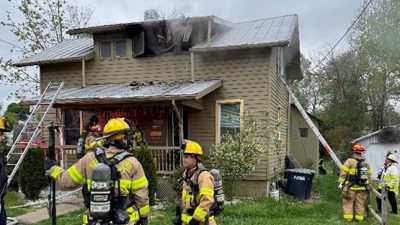
Alabama lawmakers have passed legislation to protect in vitro fertilization providers from civil and criminal liability, but providers in the state still fear legal consequences after the state Supreme Court ruled that frozen embryos should be considered children.
After the court ruling, major providers in Alabama paused IVF treatments, leaving couples wanting to start a family in limbo, and while some providers have resumed treatments after the legislation was signed by the governor, other clinics have decided to wait longer to ensure there are no legal implications for anyone involved in the procedure.
The ruling also led other states and clinics to begin to question if IVF could be in jeopardy elsewhere after the controversial court decision.
U.S. Sen. Tim Kaine (D-VA) said he wasn’t surprised when the court ruling came down.
“This is exactly what many of us predicted would happen when the Dobbs decision was rendered in the summer of 2022,” said Kaine in a conference call with reporters on Wednesday. “And Alabama isn’t the only state that is going down the path of legal definitions that threaten parents and threaten providers with serious consequences including criminal prosecution. And it is having a huge impact all across this country and depriving people have rights that they’ve taken for granted for half a century.”
Kaine invited Elizabeth Carr to President Biden’s State of the Union speech on Thursday. Carr was the first child born via IVF in the United States. She was born at Norfolk General Hospital in 1981.
Kaine told reporters that when the Carrs found their way to Norfolk, the clinic had made 40 unsuccessful efforts to take a pregnancy to term with IVF.
“There are now about 12 million Elizabeth Carrs walking around this earth. And we all know people who have been born in vitro or people as parents who have used in vitro services to build the families they want,” Kaine said. “And these 12 million Elizabeth Carrs, they’re living their best lives. They’re raising their own families. They’re contributing to their communities, and the world is so much better off because of the collective good that they have brought to this planet.”
After the Alabama decision, Carr told the media that she felt like an “endangered species.”
“It wasn’t hyperbole that I wrote, I felt like an endangered species, because it truly felt like a personal attack,” Carr said. “And many other children that are my age, a little bit younger, obviously, you know, reached out to me and said, they felt the same way to be told essentially, that they felt like they were going to be erased. Those were their words. And that’s kind of how we all felt.”
Kaine said the legislation passed after the Supreme Court ruling in Alabama doesn’t go far enough to ensure IVF treatment for families. He said that the legislation doesn’t provide immunity from a lawsuit, and while a judge would likely find in your favor if a suit was filed, it could still be a major hassle for providers, families and insurers.
Kaine is a co-sponsor of a bill called the Access to Family Building Act – a bill he said would protect the right to access in vitro fertilization, protect the right of a provider to provide those services and protect the right of an insurer to insure IVF procedures for policy holders.
“Let’s be real clear about it,” Kaine said. “Let’s make it plain that there’s a right to IVF, and it exists in every zip code in this country, and families everywhere can rely on it without worrying about some legal consequence down the road.”
Kaine said that families facing infertility already have enough uncertainty and heartache and pain connected to trying to start a family.
“Every one of us knows somebody who’s going through IVF, and we know how hard it is,” Kaine said. “And the last thing this group of people need, who are just wanting to build a family is cruel and poorly drafted legislation often with criminal consequences standing in their way.”
Kaine said the Access to Family Building Act bill is simple and straightforward.
“If we can get this passed, it’ll just provide people that sense of security that, you know, my family and I can find a doctor and determine if this is right for us, and the long arm of the law is not going to be getting in our way.”
Carr said it’s critically important that people have access to IVF treatment.
“It’s interesting when people say they are pro family, and then don’t back that up with actions,” Carr said. “I think that’s the most critical point right now is that you can’t say that you’re for family building and IVF, and then in the same breath, kind of block access to those things.”
Carr said people have reached out to her fearing the Alabama decision will affect their access to IVF treatment.
“I’ve gotten messages from around the United States from people saying, Do you think this could happen here? And, you know, sadly, yes.”
Carr said the Alabama legislation doesn’t go far enough in her opinion.
“I think for those that wanted to have the ability to access their fertility clinic, I think it gets that job done,” she said. “I do not think it goes far enough. I think there’s more work, and it’s gonna be a longer process to go, because it doesn’t clear up that inherent question of what do we do with these embryos? Is it considered life at that point? So we’re not there. This is, in my opinion, you know, a temporary band aid.”
The Access to Family Building Act now has 48 Senate co-sponsors including Kaine.
Senate Republicans blocked the legislation from being passed last week. U.S. Sen. Cindy Hyde-Smith (R-MS) objected to a call to pass the bill through unanimous consent. This marks the second time Senate Republicans have blocked legislation though would protect access to IVF nationwide.
“Freedom means having the right to decide whether, when, and how to start or build a family without interference by the government,” said Kaine. “Our effort to pass this legislation may have been blocked by a Republican senator last week, but our momentum continues to grow and we will keep fighting to get this commonsense bill across the finish line.”
Related stories
Virginia state senator on the right to contraception: ‘We are living in a dangerous time’
Virginia mom furious on Alabama IVF ruling: ‘My children would not be here’
Poll: Reproductive rights for women ‘is a winning issue for Democrats’
Virginia lawmakers sponsor bill to protect IVF after Alabama court ruling
Alabama ruling ‘sets a dangerous precedent,’ legislation would protect access to IVF










